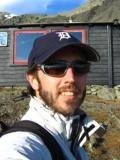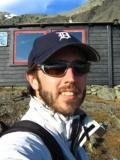Friday, May 12, 2006
The value of spontaneous crazy experiences
"I remember in Tokyo, our car stopped unexpectedly. I found right there no building, but a small area of 'weeds', excitingly different from those in Norway. Consequently, I had a splendid time for a whole hour inspecting the strange weeds. Conclusion: teach children to value spontaneous crazy experiences - crazy because usually one would say, 'There is nothing there'". (Arne Næss, Canadian Journal of Environmental Education 5, 2000, pg 54).
Friday, May 5, 2006
Merely a strand in the web of life
"Man does not weave this web of life. He is merely a strand of it. Whatever he does to the web, he does to himself." (Chief Seattle)
Tuesday, May 2, 2006
Love for the earth, eachother, and those that follow
“We seek a renewed stirring of love for the earth
We plead that what we are capable of doing is
Not always what we ought to do.
We urge that all people now determine
That a wide untrammeled freedom shall remain
To testify that this generation has love for the next.
If we want to succeed in that, we might show, meanwhile,
A little more love for this one, and for each other.”
(Nancy Newhall, This is The American Earth, 1961; taken from Deep Ecology, pg 118)
We plead that what we are capable of doing is
Not always what we ought to do.
We urge that all people now determine
That a wide untrammeled freedom shall remain
To testify that this generation has love for the next.
If we want to succeed in that, we might show, meanwhile,
A little more love for this one, and for each other.”
(Nancy Newhall, This is The American Earth, 1961; taken from Deep Ecology, pg 118)
Saturday, April 29, 2006
Modern science's ancient mentality towards nature
“The ‘control of nature’ is a phrase conceived in arrogance, born of the Neanderthal age of biology and philosophy, when it was supposed that nature exists for the convenience of man. The concepts and practices of applied entomology for the most part date from that Stone Age of science. It is our alarming misfortune that so primitive a science has armed itself with the most modern and terrible weapons, and that is turning them against the insects it has also turned them against the earth.” (Rachel Carson, Silent Spring, taken from Deep Ecology, pg 94)
Thursday, April 27, 2006
"Prayer for the great family"
Gratitude to Mother Earth, sailing through night and day -
and to her soil: rich, rare, and sweet
in our minds so be it.
Gratitude to Plants, the sun-facing light-changing leaf
and fine root-hairs standing still through wind
and rain, their dance is in the flowing spiral grain
in our minds so be it.
Gratitude to Air, bearing the soaring Swift and the silent
Owl at dawn. Breath of our song
clear spirit breeze
in our minds so be it.
Gratitude to Wild Beings, our brothers, teaching secrets,
freedoms, and ways; who share with us their milk;
self-complete, brave, and aware
in our minds so be it.
Gratitude to Water: clouds, lakes, rivers, glaciers;
holding or releasing, streaming through all
our bodies salty seas
in our minds so be it.
Gratitude to the Sun: blinding pulsing light through
trunks of trees, through mists, warming caves where
bears and snakes sleep – he who wakes us –
in our minds so be it.
Gratitude to the Great Sky
who holds billions of stars – and goes yet beyond that –
beyond all powers, and thoughts
and yet is within us –
Grandfather Space.
The Mind is his Wife.
so be it. (Gary Snyder, Turtle Island, 1974, pgs 24-25)
and to her soil: rich, rare, and sweet
in our minds so be it.
Gratitude to Plants, the sun-facing light-changing leaf
and fine root-hairs standing still through wind
and rain, their dance is in the flowing spiral grain
in our minds so be it.
Gratitude to Air, bearing the soaring Swift and the silent
Owl at dawn. Breath of our song
clear spirit breeze
in our minds so be it.
Gratitude to Wild Beings, our brothers, teaching secrets,
freedoms, and ways; who share with us their milk;
self-complete, brave, and aware
in our minds so be it.
Gratitude to Water: clouds, lakes, rivers, glaciers;
holding or releasing, streaming through all
our bodies salty seas
in our minds so be it.
Gratitude to the Sun: blinding pulsing light through
trunks of trees, through mists, warming caves where
bears and snakes sleep – he who wakes us –
in our minds so be it.
Gratitude to the Great Sky
who holds billions of stars – and goes yet beyond that –
beyond all powers, and thoughts
and yet is within us –
Grandfather Space.
The Mind is his Wife.
so be it. (Gary Snyder, Turtle Island, 1974, pgs 24-25)
Wednesday, April 26, 2006
Living with the earth - building the best character
Now I see the secret of the making of the best persons.
It is to grow in the open air, and to eat and sleep
with the earth.
(Walt Whitman, Leaves of Grass; taken from Deep Ecology, pg 77).
It is to grow in the open air, and to eat and sleep
with the earth.
(Walt Whitman, Leaves of Grass; taken from Deep Ecology, pg 77).
Monday, April 24, 2006
St. Francis and natures democracy
“The greatest spiritual revolutionary in Western history, Saint Francis, proposed what he thought was an alternative Christian view of nature and man’s relationship to it; he tried to substitute the idea of the equality of all creatures, including man, for the idea of man’s limitless rule of creation…The key to an understanding of Francis is his belief in the virtue of humility – not merely for the individual but for man as a species. Francis tried to depose man form his monarchy over creation and set up a democracy of all God’s creatures”. (Lynn White Jr., “Historical Roots of our Ecological Crisis”, 1967).
See St. Francis's canticle "Brother Sun, Sister Moon"
See St. Francis's canticle "Brother Sun, Sister Moon"
Friday, April 21, 2006
Agressively confronting violence with only love at hand
"Gandhi sought to lead the force of love into contructive channels wherever it had gone astray and he was always ready to meet men to try to persuade them to relinguish their trust in violence as a method". (Arne Næss, Gandhi and the Nuclear Age, 1965, pg 106)
Monday, April 17, 2006
The need for Deep Ecology (as explained by Devall and Sessions)
“While accepting the best of reformist environmentalism, many people have sensed that something is missing. They are asking deeper questions. They understand that the environment/ecology movement needs an articulate philosophical approach grounded upon assumptions which are different from those of the dominant worldview. They realize that a perspective is needed that will place the best of the reformist response into a coherent philosophical perspective – a philosophy based on biocentric rather than anthropocentric assumptions. This philosophy should be able to draw on the science of ecology, but should not be constrained by scientism and by the definition of Nature as just a collection of bits of data to be manipulated by humans. This philosophy should be both rational and spiritual. It should focus on ways of cultivating ecological consciousness and on principles for public environmental policy. It should be a philosophy that draws from the Earth wisdom of Native Americans and other primal cultures and that makes these approaches to wisdom relevant to contemporary, technocratic-industrial societies. In 1972, Arne Naess began discussing such a philosophy which he called deep ecology.” (Devall and Sessions, Deep Ecology, 1985, pg 61)
The Quiet Crisis
“History tells us that earlier civilizations have declined because they did not learn to live in harmony with the land. Our successes in space and our triumphs of technology hold a hidden danger: as modern man increasingly arrogates to himself dominion over the physical environment, there is the risk that his false pride will cause him to take the resources of the earth for granted – and to lose all reverence for the land.” (Stuart Udall, The Quiet Crisis, 1962, taken from Deep Ecology, pg 59).
Santayana and the Genteel Tradition
“A Californian whom I had recently the pleasure of meeting observed that if the philosophers had lived among your mountains, their systems would have been different form what they are. Certainly very different from what those systems are which the European genteel tradition has handed down since Socrates; for these systems are egotistical; directly or indirectly they are anthropocentric, and inspired by the conceited notion that man, or human reason, or the human distinction between good and evil, is the center and pivot of the universe. That is what the mountains and the woods should make you at last ashamed to assert.” (George Santayana, “The Genteel Tradition in American Philosophy” speech presented at the University of California at Berkeley, 1911 – taken from from Deep Ecology, pg 47)
Ecosystems and understanding the Self
“[natural systems are] both as the source of physical nutrition and as the body of metaphors from which our spirits draw sustenance. To understand natural systems is to begin an understanding of the self”. (Jim Dodge, a sheep rancher in Western Sonoma County, California, taken from Deep Ecology pg 21).
Friday, April 14, 2006
Volunteerism as a strengthener to social change
"What people take upon themselves to do voluntarily, day by day, in the way of removing social evils, gives them a moral right to take, whenever necessary, a greater part in curing other such evils and in overcoming other such obstacles to constructive reform. When men cooperate, however modestly, toward common ends, they inevitably acquire valuable training for the kind of large-scale cooperation they will require in times of active struggle." (Arne Næss, Gandhi and the Nuclear Age, 1965, pg 67)
Thursday, April 13, 2006
Alienation of humans from all nature via technology
“Technological society not only alienates humans from the rest of Nature but also alienates humans from themselves and from each other…The technological worldview has as its ultimate vision the total conquest and domination of Nature and spontaneous natural processes – a vision of a ‘totally artificial environment’ remodeled to human specifications and managed by humans for humans.” (Devall and Sessions, Deep Ecology, pg 48).
Boredom and lack of wisdom
“[In contemporary cultures] Our pathology consists in our dedication to abstractions, to our collectivism, pseudo-individualism, and lack of institutional means for the expression and transcendence of human ambivalence…Our illness springs from the very center of civilization, not from too much knowledge, but from too little wisdom…”. (Stanley Diamond, In Search of the Primitive, taken from Deep Ecology, pgs 20-21)
Self-realization and openness
To study the Way is to study the self.
To study the self is to forget the self.
To forget the self is to be enlightened
by all things.
To be enlightened by all
things is to remove the
barriers between one’s self
and others.
(Dōgen, taken from Deep Ecology, pg, 11)
To study the self is to forget the self.
To forget the self is to be enlightened
by all things.
To be enlightened by all
things is to remove the
barriers between one’s self
and others.
(Dōgen, taken from Deep Ecology, pg, 11)
Subscribe to:
Comments (Atom)

